Mental Health Awareness Month, 2024 (Week 1)
Mental Health Status

Every May (Mental Health Awareness Month) our teams work diligently to stop the stigma and raise awareness of mental illness, and mental health treatments. You might be surprised to learn that 22.8% of US adults have a mental illness. That is almost one out of every four persons. The data for adolescents is even more staggering. 49% of children aged 13 to 18 have a mental illness. These numbers highlight the incredible need for our services across all age groups.
Let’s look at the prevalence of mental illness in America (according to the National Institute of Mental Health https://www.nimh.nih.gov/health/statistics/mental-illness#part_2538):
Any mental illness (AMI) is defined as a mental, behavioral, or emotional disorder. AMI can vary in impact, ranging from no impairment to mild, moderate, and even severe impairment.
Prevalence of AMI:
- In 2021, there were an estimated 57.8 million adults aged 18 or older in the United States with AMI. This number represented 22.8% of all U.S. adults.
- The prevalence of AMI was higher among females (27.2%) than males (18.1%).
- Young adults aged 18-25 years had the highest prevalence of AMI (33.7%) compared to adults aged 26-49 years (28.1%) and aged 50 and older (15.0%).
- The prevalence of AMI was highest among the adults reporting two or more races (34.9%), followed by American Indian / Alaskan Native (AI/AN) adults (26.6%). The prevalence of AMI was lowest among Asian adults (16.4%).
- An estimated 49.5% of adolescents had any mental disorder.
Mental Health Services – AMI:
- In 2021, among the 57.8 million adults with AMI, 26.5 million (47.2%) received mental health services in the past year.
- More females with AMI (51.7%) received mental health services than males with AMI (40.0%).
- The percentage of young adults aged 18-25 years with AMI who received mental health services (44.6%) was lower than adults with AMI aged 26-49 years (48.1%) and aged 50 and older (47.4%).
- Serious mental illness (SMI) is defined as a mental, behavioral, or emotional disorder resulting in serious functional impairment, which substantially interferes with or limits one or more major life activities. The burden of mental illnesses is particularly concentrated among those who experience disability due to SMI.
Severe mental illness (SMI) is defined as a mental, behavioral, or emotional disorder resulting in serious functional impairment, which substantially interferes with or limits one or more major life activities. The burden of mental illnesses is particularly concentrated among those who experience disability due to SMI.
Prevalence of SMI:
- In 2021, there were an estimated 14.1 million adults aged 18 or older in the United States with SMI. This number represented 5.5% of all U.S. adults.
- The prevalence of SMI was higher among females (7.0%) than males (4.0%).
- Young adults aged 18-25 years had the highest prevalence of SMI (11.4%) compared to adults aged 26-49 years (7.1%) and aged 50 and older (2.5%).
- The prevalence of SMI was highest among AI/AN adults (9.3%), followed by adults reporting two or more races (8.2%). The prevalence of SMI was lowest among Asian adults (2.8%).
- Of adolescents with any mental disorder, an estimated 22.2% had severe impairment and/or distress. DSM-IV based criteria were used to determine severity level.
Mental Health Services – SMI:
- In 2021, among the 14.1 million adults with SMI, 9.1 million (65.4%) received mental health treatment in the past year.
- More females with SMI (67.6%) received mental health treatment than males with SMI (61.3%).
- The percentage of young adults aged 18-25 years with SMI who received mental health treatment (57.9%) was lower than adults with SMI aged 26-49 years (67.0%) and aged 50 and older (71.0%).
These sobering statistics point out the work still to be done. Let’s use this month to spread awareness and attempt to reduce the stigma surrounding mental illness. Learn more about how Psychiatric Medical Care is improving access to mental health treatment. Our Senior Life Solutions program is a hospital-based intensive outpatient program that helps older adults who are experiencing anxiety, depression and other mental health challenges. Integrated Telehealth Partners provides flexible, cost-effective solutions to hospitals, health systems and jails to ensure patients recieve behavioral health services in a timely manner. Embrace Health offers teletherapy and telepsychiatry services and our new adolescent mental health clinic in Tennessee, Embrace U, provides intensive outpatient therapy programs to children and teens who are experiencing symptoms of a mental health condition.
If you or someone you know is in need of a behavioral health placement, behavioral health referral, or experiencing a mental health emergency or crisis, please do not use this website. Instead, use these crisis resources to speak with someone now or access local support.

